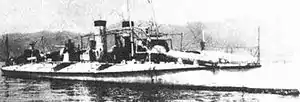Japanese torpedo boat Kotaka
Kotaka (小鷹, ”Little Falcon”) was a torpedo boat of the Imperial Japanese Navy. She was ordered in 1885 from the shipbuilder Yarrows in London, Great Britain, where she was built in parts along Japanese specifications, and then assembled in Yokosuka Naval Arsenal, Japan.
 Kotaka (1887) | |
| History | |
|---|---|
| Name: | Kotaka |
| Ordered: | 1885 |
| Builder: | Yarrow & Company, United Kingdom |
| Laid down: | 1887 |
| Completed: | 10 October 1888 |
| Commissioned: | 19 August 1890 |
| Decommissioned: | 1 April 1908 |
| General characteristics | |
| Type: | Torpedo boat |
| Displacement: | 203 long tons (206 t) |
| Length: | 50.3 m (165 ft) |
| Beam: | 5.8 m (19 ft) |
| Draught: | 1.7 m (5 ft 7 in) |
| Propulsion: | Coal-fired engine (mixed coal/oil from 1904), 1,400 hp (1,044 kW) |
| Speed: | 19 knots (22 mph; 35 km/h) |
| Armament: |
|
She participated in the First Sino-Japanese War (1894–1895) and the Russo-Japanese War (1904–1905). She was decommissioned on 1 April 1908, to become a training ship. She was retired on 1 March 1916, but again reactivated in 1917, ending her career in January 1927.
When launched in 1888, Kotaka, at 203 tons, was the largest torpedo boat in the world, and "was the forerunner of torpedo-boat destroyers that appeared a decade later".[1] She was armed with four 1-pounder (37 mm) quick-firing guns and six torpedo tubes. In the following years, the Imperial Japanese Navy equipped itself with much smaller torpedo boats of French design, but in her trials in 1899, Kotaka demonstrated that she could go beyond a role of coastal defense, and was capable of following larger ships on the high seas. The British shipbuilder Yarrow "considered Japan to have effectively invented the destroyer".[2]
According to the The Engineer dated 2 July 1886, an item reported that the British shipyard of Messrs. Yarrow & Co. at Poplar built for account of the Japanese government a torpedo boat of which the design was not the usual type. She was larger as the torpedo boats until then built while her vulnerable parts including the machinery were protected against machine-gun fire by 1" armour made of steel. Main dimensions were 166 x 19 feet, with a displacement of 203 tons. The 1,400-hp engines delivered via twin screws gave her a speed of 19-20 knots possible.
The torpedo boat was disassembled and shipped to Japan where she was to be assembled again. She was armed with two torpedo tubes placed in fixed bow launching tubes for (gunpowder-ejected) torpedoes. Amidships and aft were on the exposed deck were turntables placed for mounting each a pair of torpedo guns. It was almost possible to fire parallel with this guns. Yarrow had already built 8 years earlier torpedo boats for Japan which were designed by Sir Edward John Reed.
In 1904, Kotaka was experimentally refitted with a mixed oil and coal engine, instead of her original coal-only propulsion.
Notes
- Kaigun, David C. Evans
- Howe
References
- Kaigun: Strategy, Tactics, and Technology in the Imperial Japanese Navy, 1887–1941, David C. Evans, Mark R. Peattie, Naval Institute Press, Annapolis, Maryland ISBN 0-87021-192-7
- The Origins of Japanese Trade Supremacy: Development and Technology in Asia from 1540 to the Pacific War, Christopher Howe, The University of Chicago Press, ISBN 0-226-35485-7
- Lengerer, Hans (2017). "Torpedo Boats of the Imperial Japanese Navy, Part III". Warship International. LIV (4): 293–306. ISSN 0043-0374.